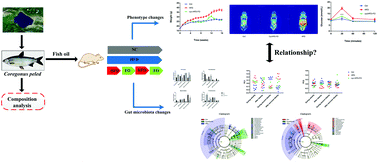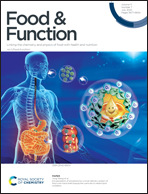Fish oil extracted from Coregonus peled improves obese phenotype and changes gut microbiota in a high-fat diet-induced mouse model of recurrent obesity†
Abstract
Recurrent obesity is rapidly emerging as a public health problem. Previous studies have confirmed that fish oil supplementation can alleviate obesity in mice; however, the effect of fish oil on recurrent obesity remains unclear. In the present study, the modulatory effects of fish oil extracted from Coregonus peled on the phenotypes and gut microbiota of recurrent obese mice were evaluated by MRI, OGTT, and bioinformatics analysis. We found that fish oil supplementation could significantly reduce the body weight gain, net weight gain, body fat distribution, and glucose tolerance. In addition, the composition and structure of gut microbiota were significantly shifted toward those of the control group by fish oil treatment. Moreover, the relative abundance of gut microbiota, such as Bacteroidetes, Bacteroidia, Lachnospiraceae, and Bifidobacterium, was markedly responding to the rapid dietary changes between fish oil and high-fat diet. Overall, our results confirmed that the alleviation of recurrent obesity using fish oil supplementation might be modulated by altering the hysteretic behavior and memory-like function of gut microbiota. We proposed that further studies are needed to elucidate the modulation mechanism.



 Please wait while we load your content...
Please wait while we load your content...